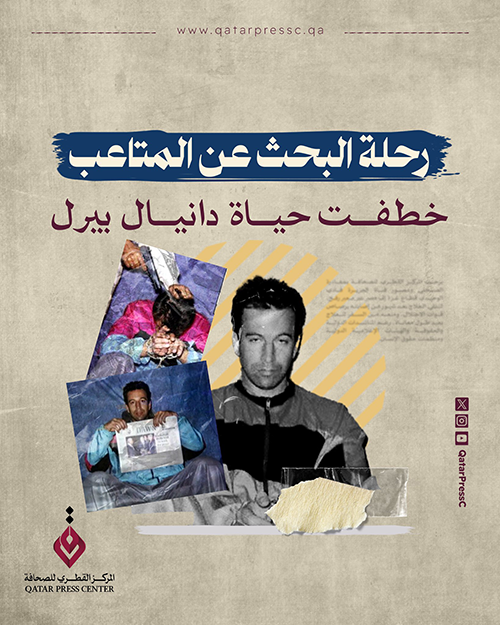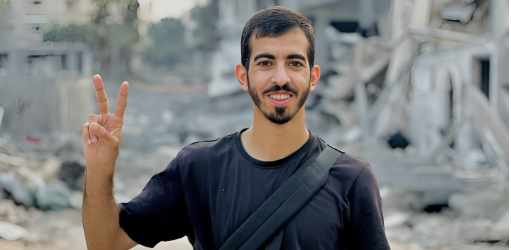This is a notification message.

The case of the murder of American journalist Daniel Pearl on February 21, 2002, continues to raise controversy over the impunity of perpetrators in crimes targeting journalists for murder in one of the most heinous crimes.
Pearl, 38, was the South Asia bureau chief for the Wall Street Journal when he was kidnapped and beheaded while reporting on militant groups in Pakistan. In June 2002, a Karachi anti-terrorism court sentenced British-Pakistani Omar Saeed Sheikh, the ringleader of the kidnappings, to death, and three others to 25 years in prison, amid suspicions that a larger network was involved in the crime.
Omar Sheikh appeared before the court in Karachi, where he was identified by a taxi driver who told the court that he saw him taking the American journalist in a car from a restaurant.
Omar (29 years old) confessed before the anti-terrorism court that he was the mastermind behind the kidnapping and killing of Pearl.
In January 2021, the Pakistani Supreme Court acquitted those involved in Pearl's kidnapping and murder, while Omar Saeed Sheikh remains in detention under the Public Safety Act, which allows authorities to detain anyone deemed to pose a threat to public order.
His career
Daniel Pearl was born in Princeton, New Jersey, and graduated from Stanford University, receiving a B.A. with high honors in communications. Daniel Pearl began his career in Western Massachusetts at the North Adams Transit and Berkshire Eagle newspapers, and has worked in various offices of The Wall Street Journal, starting in Atlanta in 1990. He moved to the newspaper's Washington, D.C., headquarters in 1993, with his communications experience, and joined the newspaper's London team in 1996. During his journalistic career, Pearl wrote numerous articles, conducted famous investigations, and was a highly experienced journalist.
Why did they kill him?
Following the September 11 attacks on the United States in 2001, Pearl traveled to Pakistan to investigate links between militants in Pakistan and Richard C.
Reid, known as the "shoe bomber," for attempting to detonate a bomb while on a flight from Paris to Miami in 2001.
On January 23, 2002, Pearl was on his way to Karachi when he was kidnapped by a group of militants calling themselves the National Movement for the Liberation of Pakistan. Initially, photos emerged of Pearl in handcuffs with a gun pointed at his head. After his disappearance, a reward program was offered for information leading to his kidnapping, and on February 21, 2002, a videotape was posted on the Internet showing Pearl reading a statement in English, saying that Muslims were being persecuted in many parts of the world. He appeared calm as he spoke, and as soon as he finished reading the statement, a hand appeared from behind him, grabbed his head, and he was slaughtered.
Then his killer separated his body from his head ! Then one of the hijackers appeared on the screen and read a 16-second message in Urdu, demanding an end to the atrocities being committed against Muslims in the world, the release of detainees at the American Guantanamo base, and the delivery to Pakistan of American-made F-16 aircraft, which the United States had suspended delivery to Islamabad! Three months later, Pearl's mutilated body was found in a shallow grave, and Pakistani authorities quickly arrested the kidnappers.
At the time, the International Federation of Journalists expressed its deep shock at the horrific and brutal crime, and said: Pearl did not represent his government or any political movement, but was an active journalist committed to his normal professional activities.
A collection of his writings was published posthumously in 2002 (In My Home the World), which reflects his exceptional writing skills, in addition to his articles published in the Wall Street Journal, and in 2011 he was awarded the World Press Freedom Hero Award by the International Press Institute.
Daniel Pearl Foundation
The Daniel Pearl Foundation was founded by the Daniel Pearl family to promote mutual respect and understanding among diverse cultures in journalism, music and dialogue, to provide scholarships to bring journalists from the Middle East and South Asia to the United States to work with American newspapers, and to provide training programs for young journalists. - In 2005, his friends established an educational scholarship in his name. HBO produced a 79-minute documentary, Jihadism: The Killing of Daniel Pearl, chronicling his life and death and was nominated for an Emmy Award.
- In 2005, The Wall Street Journal, in conjunction with the School of Journalism and Science, presented the first Daniel Pearl Award to Louis Vigneault-Dubois of Canada.

تستقبل نساء غزة يوم الأم...

تواصل الآلة الإعلامية الإسرائيلية حربها...